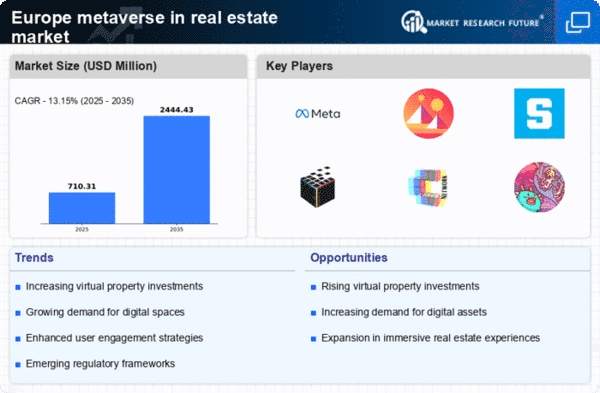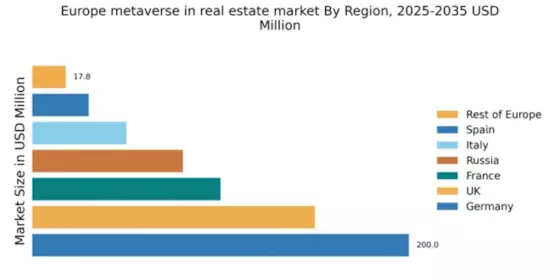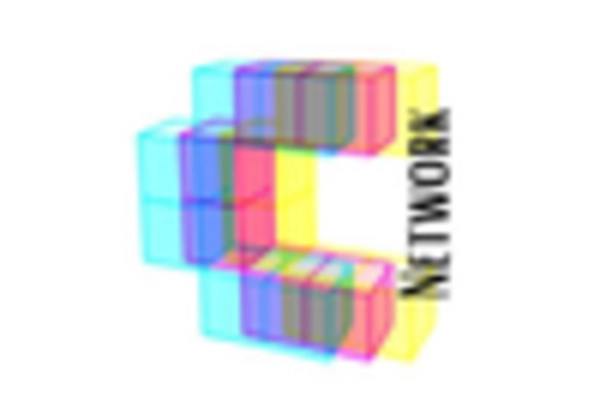Rise of Collaborative Virtual Spaces
The metaverse in-real-estate market is benefiting from the rise of collaborative virtual spaces, where users can interact, work, and socialize in shared environments. This trend is particularly appealing to businesses seeking innovative ways to engage with clients and employees. In Europe, the demand for virtual meeting spaces has increased by approximately 25% over the past year, as companies recognize the advantages of remote collaboration. These collaborative environments not only enhance user engagement but also create new opportunities for real estate developers to design and monetize virtual spaces. As this trend continues, the metaverse in-real-estate market is likely to see a diversification of offerings, catering to various user needs.
Regulatory Developments and Compliance
The metaverse in-real-estate market is increasingly influenced by regulatory developments and compliance requirements. As virtual properties gain traction, European governments are beginning to establish frameworks to govern transactions and ownership rights in the digital realm. This regulatory clarity is essential for fostering trust among investors and consumers. For instance, recent initiatives in countries like Germany and France aim to create guidelines for virtual property transactions, which could enhance market stability. As these regulations evolve, they may significantly impact the operational landscape of the metaverse in-real-estate market, potentially leading to increased participation from institutional investors.
Increased Demand for Digital Real Estate
The metaverse in-real-estate market is witnessing a notable increase in demand for digital real estate assets. As more individuals and businesses recognize the potential of virtual properties, investments in digital land and spaces are on the rise. Recent data indicates that the value of virtual real estate in Europe has surged by over 40% in the past year, driven by the growing interest in virtual experiences and online communities. This trend suggests that digital real estate is becoming a viable alternative to traditional investments, attracting both seasoned investors and newcomers. Consequently, the metaverse in-real-estate market is likely to expand as more stakeholders seek to capitalize on this emerging asset class.
Technological Advancements in Virtual Reality
The metaverse in-real-estate market is experiencing a surge in technological advancements, particularly in virtual reality (VR) and augmented reality (AR). These technologies enhance user experiences by providing immersive property tours and interactive environments. In Europe, the adoption of VR tools has increased by approximately 30% in the last year, allowing potential buyers to visualize properties without physical visits. This shift not only streamlines the buying process but also attracts a younger demographic that values digital engagement. As VR technology continues to evolve, it is likely to play a pivotal role in shaping the future of property transactions, making the metaverse in-real-estate market more accessible and appealing to a broader audience.
Growing Interest in Sustainable Virtual Developments
The metaverse in-real-estate market is increasingly focused on sustainable virtual developments, reflecting a broader societal shift towards environmental consciousness. As consumers become more aware of sustainability issues, there is a growing demand for virtual properties that incorporate eco-friendly designs and practices. Recent surveys indicate that approximately 60% of European buyers express a preference for sustainable features in both physical and virtual properties. This trend suggests that developers in the metaverse are likely to prioritize sustainability in their projects, potentially leading to innovative designs that resonate with environmentally conscious consumers. As a result, the metaverse in-real-estate market may evolve to include a wider range of sustainable offerings.

















